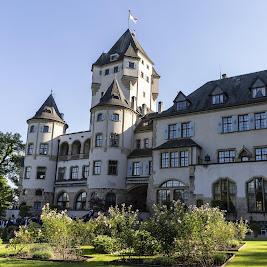Two times a year by convention, occurring on the days following the equinox festivals of Eostrefest and Mabon, the Emperor, his family, his court officials, and the army of retainers, servants, and bodyguards attending to all of them set out from one city to another. Then, for the remaining half of the year, they hold court at their destination.
Traditionally though not officially, one of these yearly trips is always to Falkenau, so court is held there half the year. Where the Emperor rules from the other half of the year, however, is more varied. It is always an important city of Vardessy, and those of the Crownlands are favored for practical reasons; not only are they closer at hand, the journey there is safer, as it is less likely to pass through the domains of warring nobles and those with plots against the Emperor. Still, the Itinerary has been known to travel as far as Dernburg before, necessitating longer journeys and shorter stays in a given city.
To be chosen as an Imperial residence is a matter of great honor for a Vardessian city. Not only does it indicate that the Emperor himself found the city worthy of his attention, it also draws great prestige by the court's presence, attracting merchants and diplomats to the town. The court travels in a grand procession, too, riding in velvet-draped carriages and accompanied by shining knights and skilled minstrels. These processions draw great crowds eager to see the court pass by; for many citizens of Vardessy, this is their only opportunity to so much as be in the presence of anyone so powerful. So too, if the Emperor's journey is a long one, he will stop at any number of cities and towns along the way, usually staying in town for a day to perform his duties there and then leaving the next. To even be visited by the Emperor so fleetingly is something that many a burgomaster holds with honor.
There are a number of reasons for the Imperial Itinerary. As Vardessy is such a vast and disorganized land, to keep the Emperor moving between settlements allows him to be closer to his people and their concerns, promoting unity among them. While the Emperor is at a given town, the people there present their concerns to him, allowing him to settle disputes; this helps maintain order over the far-flung reaches of the realm. More practically, it also allows the court to keep an eye on any rebellious nobles that may need to be kept in line. In turn, the Itinerary is not without danger, for it puts the Emperor closer to rival powers that may wish to see him deposed - forcefully if necessary, and indeed, such a fate has befallen past rulers of Vardessy. Harald IV, in his efforts to strengthen the unity of the Vardessian nation, has been a staunch proponent of the Itinerary and has made an effort to travel to as many corners of his domain as possible during his reign. But so too, it is not lost on him that his philosophy is not the most popular with the regional dukes, and his court is prepared for the worst.
A side effect of the Itinerary is the need to construct suitable palaces for the Emperor's visits. As the court announces their planned destinations for the Itinerary two years in advance, some cities have used this time to build new residences for the court by the time they arrive, with guilds of masons and architects eager to impress the Emperor in the hopes of securing an endorsement. In some cases, the fact the visits are scheduled ahead of time runs into conflicts; on a few occasions, the Emperor has arrived to his destination only to find that a war has broken out in the meantime, forcing a ceasefire during his stay.
Furthermore, there is the matter of what to do with the palaces when the Emperor leaves. Some of them have been claimed by nobles or converted into monasteries. Other times, however, palaces have been left empty for years or even decades, waiting for the Emperor to return to them. There is no shortage of treasure left in these places, but so too, there are other things that may have claimed them in the Emperor's absence. And, should the Emperor wish to return to such a long-neglected hall, it may be necessary to clear it of anyone - or anything - that may have taken up residence since...
.jpg)


No comments:
Post a Comment